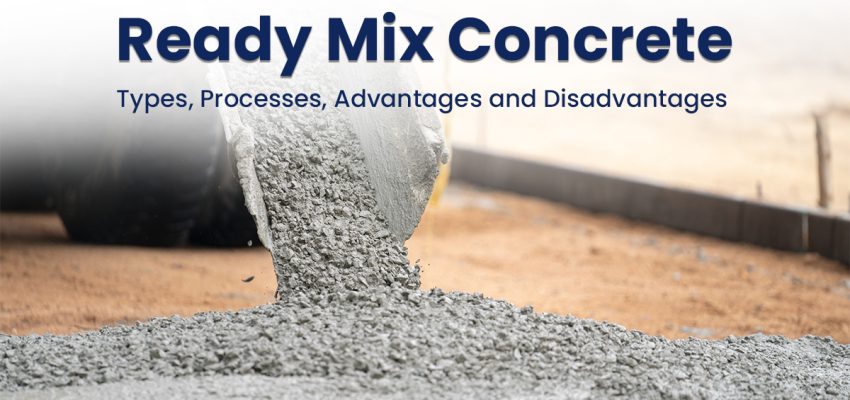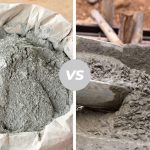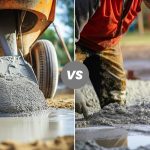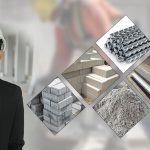Ready mix concrete, or RMC, is a special kind of concrete made in a plant. It’s like cooking with a recipe: workers mix it according to a set plan. After that, it’s carried to the construction site by big trucks with mixers on them. People also call it ‘concrete in a box’ because it arrives at the construction site ready to use. Read our comprehensive guide on Ready-mix concrete to know more about its benefits, types, etc.
Post your Requirement
Types Of Ready Mix Concrete
Ready mix concrete comes in various types tailored for different construction needs:
- Normal Concrete: The go-to choice for many projects, suitable for foundations, walls, and floors.
- High-Strength Concrete: With a higher compressive strength, ideal for heavy-duty structures like high-rise buildings and bridges.
- Self-Compacting Concrete: Highly flowable, it effortlessly fills complex shapes without vibration, commonly used for architectural and decorative purposes.
- Lightweight Concrete: Featuring lower density, perfect for structures where weight is a concern, such as bridges, tunnels, and precast elements.
- Fiber-Reinforced Concrete: Enhanced with fibers to boost strength and durability, commonly used in pavements, bridges, and parking lots.
Ready Mix Concrete Process
The Ready Mix Concrete process involves several key steps. The Control Room acts like the brain, making sure the right measurements reach each part of the plant for the specified concrete mix. In the Aggregate Bins, different materials are carefully weighed and sent to the mixing station. Cement Silos store the cement, weighing and transferring it to be mixed with aggregates. Water and additives are introduced, starting the formation of the wet concrete mix, with additives added for strength or workability. At the Mixing Station, dry ingredients combine with water until the concrete reaches the correct consistency. Finally, at the Discharge Point, the mixture is loaded into the back of a rotating drum truck, ensuring consistency during transportation to the job site.
Advantages Of Using Ready Mix Concrete
Ready-mixed concrete offers several advantages for construction projects:
- Quality Assurance: Ready-mixed concrete is produced in controlled environments, ensuring precise measurements and the use of high-quality materials, resulting in a reliable and consistent product.
- Efficiency in Construction: Once delivered, construction can commence immediately, saving time and eliminating the need for on-site mixing. This efficiency is especially valuable for projects like building foundations, walls, flooring, or other structures.
- Minimal Waste: Customized to meet specific project requirements, ready-mixed concrete reduces waste. Any excess or leftover concrete can be recycled, minimizing environmental impact.
- Tailored Mixes: The composition of ready-mixed concrete can be adjusted to meet the unique needs of a project. Whether you need a specific strength, consistency, or volume, customization is possible.
- Dust Reduction: Since ready-mixed concrete is prepared in batching plants, where dust is managed effectively, on-site dust pollution is minimized. The wet mix further reduces airborne dust during transport and placement.
- Cost-Effective: Purchasing ready mixed concrete eliminates the need to buy individual components separately. Suppliers can buy materials in bulk, passing on cost savings to customers and making the overall product more affordable.
- Time-Saving: By outsourcing the mixing, supplying, and delivering processes to professionals, construction teams save time. There’s no need to set up and dismantle on-site equipment, allowing the project to move forward promptly after the concrete is delivered.
Disadvantages Of Using Ready Mix Concrete
Below we have stated some of the disadvantages of using Ready Mix Concrete:
- Higher Cost: Ready-mixed concrete may be more expensive compared to traditional on-site mixed concrete, impacting project expenses.
- Quality Control Challenges: Quality control can be a concern since the concrete is not made on-site, leading to potential issues in ensuring consistent quality.
- Transit Delays: The time it takes for ready-mix concrete to travel from the plant to the construction site can cause delays, affecting the project’s timeline.
- Segregation Risk: If not mixed properly, there’s a risk of concrete becoming segregated, which can harm the quality of the final construction product.
Tips to Consider While Purchasing Ready Mix Concrete
When buying ready-mix concrete, consider these tips for a smooth process:
- Determine Strength Needs: Consult with an engineer to figure out the required concrete strength for your project. This ensures the concrete can bear the intended load. Calculate Quantity: Calculate the amount of concrete needed to avoid overordering or falling short. This minimizes wastage and keeps costs in check.
- Select the Right Mix: Different concrete mixes have varied properties. Choose one that aligns with your project’s requirements, considering factors like strength and durability.
- Check Supplier’s Reputation: Opt for a supplier known for quality and reliability. Read reviews, seek references, and ensure the supplier has a positive track record.
- Verify Delivery Schedule: Confirm that the supplier can deliver within your timeframe. Punctual delivery prevents construction delays, keeping your project on track.
Conclusion
Ready-mix concrete is a handy and affordable choice for construction projects of any size. It’s liked for its consistent quality, time-saving advantages, and positive impact on the environment. When buying it, think about things like how strong it needs to be, how much you need, the type of mix, the supplier’s reputation, and when it will be delivered. Considering these factors helps you get the right concrete for your project.
FAQs
Q-1. What is meant by ready-mix concrete?
A-1. Ready mix concrete (RMC) is a type of concrete that’s prepared in a special plant according to a specific recipe. It’s then transported to a construction site using trucks, ready to be used immediately.
Q-2. What is the mixture of ready-mix concrete?
A-2. The mixture of ready-mix concrete typically includes cement, water, sand, and gravel. These ingredients are carefully measured and mixed in a controlled environment to ensure consistency and quality.
Q-3. What is the method of ready-mix concrete?
A-3. The method of ready-mix concrete involves batching the ingredients in a plant, where they are mixed thoroughly. Once the mixing is complete, the concrete is transported to the construction site in truck-mounted transit mixers, where it is ready for immediate use.
 Get App
Get App 




















Post A Comment